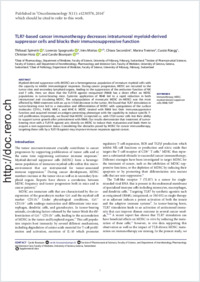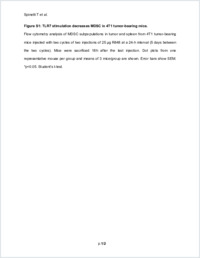TLR7-based cancer immunotherapy decreases intratumoral myeloid-derived suppressor cells and blocks their immunosuppressive function
- Spinetti, Thibaud Pharmacology, Department of Medicine, Faculty of Science, University of Fribourg, Switzerland
- Spagnuolo, Lorenzo Pharmacology, Department of Medicine, Faculty of Science, University of Fribourg, Switzerland
- Mottas, Inès Pharmacology, Department of Medicine, Faculty of Science, University of Fribourg, Switzerland - Section of Pharmaceutical Sciences, Faculty of Science, and Department of Anesthesiology, Pharmacology and Intensive Care, Faculty of Medicine, University of Geneva, Switzerland
- Secondini, Chiara Pathology, Department of Medicine, Faculty of Science, University of Fribourg, Switzerland
- Treinies, Marina Pharmacology, Department of Medicine, Faculty of Science, University of Fribourg, Switzerland
- Rüegg, Curzio Pathology, Department of Medicine, Faculty of Science, University of Fribourg, Switzerland
- Hotz, Christian Pharmacology, Department of Medicine, Faculty of Science, University of Fribourg, Switzerland
- Bourquin, Carole Pharmacology, Department of Medicine, Faculty of Science, University of Fribourg, Switzerland - Section of Pharmaceutical Sciences, Faculty of Science, and Department of Anesthesiology, Pharmacology and Intensive Care, Faculty of Medicine, University of Geneva, Switzerland
-
01.11.2016
Published in:
- OncoImmunology. - 2016, vol. 5, no. 11, p. e1230578
English
Myeloid-derived suppressor cells (MDSC) are a heterogeneous population of immature myeloid cells with the capacity to inhibit immunological responses. During cancer progression, MDSC are recruited to the tumor sites and secondary lymphoid organs, leading to the suppression of the antitumor function of NK and T cells. Here, we show that the TLR7/8 agonist resiquimod (R848) has a direct effect on MDSC populations in tumor-bearing mice. Systemic application of R848 led to a rapid reduction in both intratumoral and circulating MDSC. The subpopulation of monocytic MDSC (m-MDSC) was the most affected by R848 treatment with an up to 5-fold decrease in the tumor. We found that TLR7 stimulation in tumor-bearing mice led to a maturation and differentiation of MDSC with upregulation of the surface molecules CD11c, F4/80, MHC-I, and MHC-II. MDSC treated with R848 lost their immunosuppressive function and acquired instead an antigen-presenting phenotype with the capability to induce specific T-cell proliferation. Importantly, we found that MDSC co-injected s.c. with CT26 tumor cells lost their ability to support tumor growth after pretreatment with R848. Our results demonstrate that treatment of tumor-bearing mice with a TLR7/8 agonist acts directly on MDSC to induce their maturation and leads them to acquire a non- suppressive status. Considering the obstacles posed by MDSC for cancer immunotherapy, targeting these cells by a TLR7/8 agonist may improve immune responses against cancer.
- Faculty
- Faculté des sciences et de médecine
- Department
- Médecine 3ème année
- Language
-
- English
- Classification
- Biological sciences
- License
-
License undefined
- Identifiers
-
- RERO DOC 278675
- DOI 10.1080/2162402X.2016.1230578
- Persistent URL
- https://folia.unifr.ch/unifr/documents/305421
Other files
Statistics
Document views: 140
File downloads:
- pdf: 168
- Supplementary material: 147

